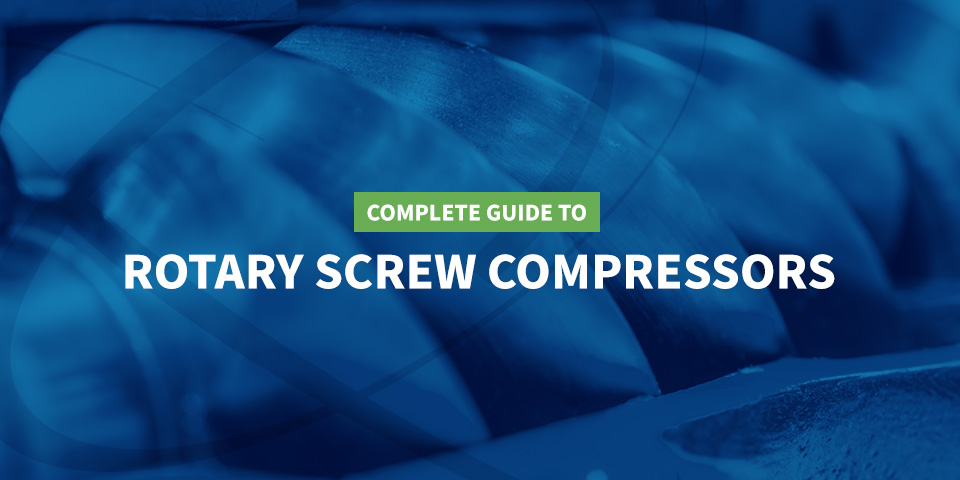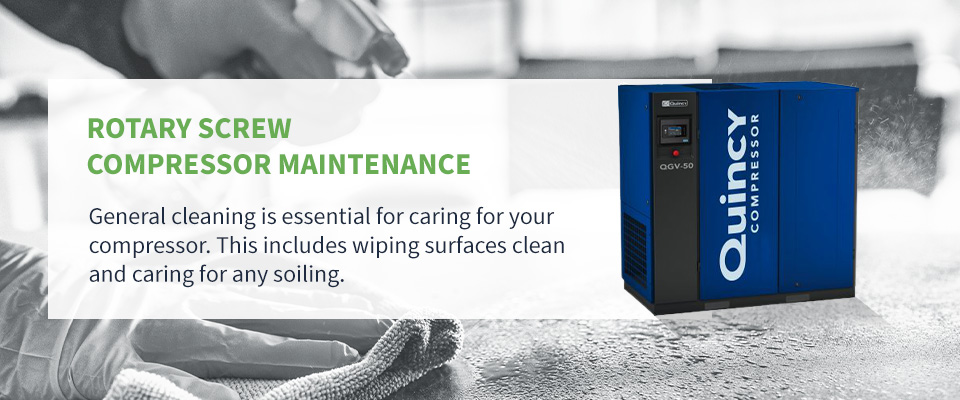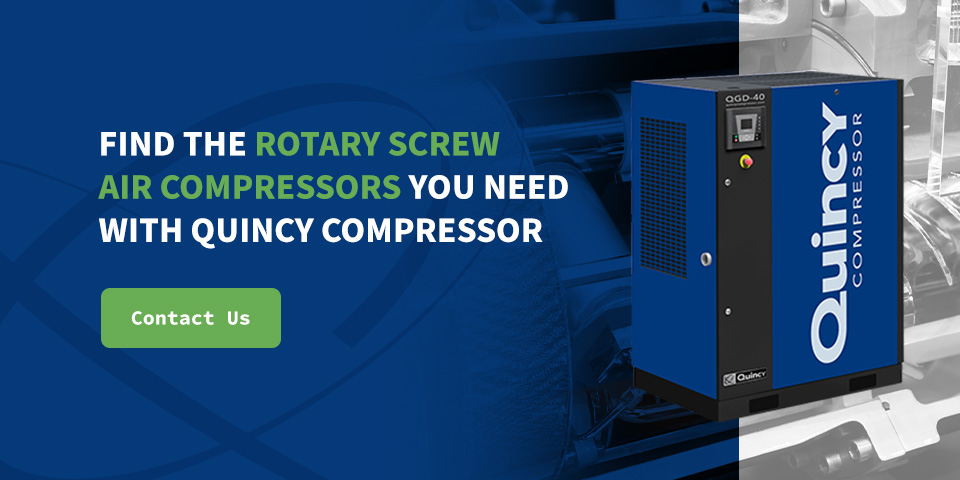
No matter what you do, you want the right tool for the job. For various applications, a rotary screw air compressor is the right machine. Whether you’re familiar with air compressors or you don’t know a lot about this particular type, we’re here to help.
We’ve put together a complete guide to rotary screw air compressors to help you see if these machines would work for your operations. Learn more about this equipment, from how it works to the industries that use it.
What Is a Rotary Screw Air Compressor?
A rotary screw air compressor uses screw mechanisms to compress air by reducing the volume air takes up. It’s just one type of air compressor available for use in various industries and purposes. Because of their mechanisms, these machines are occasionally called “twin screw compressors.” Industries that require large volumes of high-pressure air often choose a rotary screw compressor for their operations.
Rotary Screw Compressor Components
Every component in the compressor system is critical to the unit’s function. Understanding these pieces provides fundamental knowledge about how rotary compressors work. Here are the essential components:
- Airend: This part is the heart of the air compressor and the site of compression. This component has an inlet valve to combine air with oil throughout the compression process.
- Air filter: It is essential to filter the air before it reaches the inlet valve. Air compressors must mount to the compressor or connect with a hose. Look for the area with the cleanest, coolest air and place the filter there for the best results.
- Primary separation tank: Compressed air mixes with compressor oil as it travels from the airend. The primary separation tank allows the first round of filtration to occur. Mechanical separation and centrifugal force work to form oil droplets, which then fall to the bottom, allowing the tank to become an oil reservoir.
- Secondary separation filter: Compressed air needs additional filtration to become completely clean. The remaining oil and air mixtures go through the secondary separation filter. Here, filters catch the oil and direct it back to the central oil system. Air leaving this filter will be free of oil.
- Oil filter: This component’s job is to gather loose particles from the oil collection. You can place an oil filter at one of the various intervals on the compressor loop.
- Oil cooler: The air compression process produces a significant amount of heat, which can cause oil to get very hot. The fluid must go through a cooler to shed some of that heat before cycling into the compressor again. Some rotary compressors use an air-to-liquid cooler, while others use a liquid-to-liquid cooler.
- Hoses: Hoses must meet the chemical, heat and pressure specifications of the oil you use to avoid causing excess wear and tear or hose failure. These failures can be incredibly dangerous and could result in repairing or replacing the unit.
How Do Rotary Compressors Work?
Rotary screw air compressors use positive displacement, a process that involves pulling air into a chamber. It reduces the volume in the chamber to compress the air. Rotary screw air compressors, specifically, utilize positive displacement with spiral screws that rotate in precise alignment. The screws produce a hydraulic seal to compress the air.
Understanding the Rotary Compression Cycle
An oil-flooded system, which is the more common type of rotary screw compressor, uses this process to complete the compression cycle:
- Air enters the machine: Air around the system enters it through the inlet valve. Ideally, this will be clean air free of excessive dust, dirt or debris, but it will depend on where you keep the machine.
- Air travels through the machine: The air moves through the pressure control line. It goes through the regulator valve, which sets the air pressure.
- Oil and air enter the compressor: Oil and air move into the compressor to combine into a mist.
- The air compresses: The air compresses as it travels the matching rotary screws.
- The air exits the compressor: The air and oil mist leaves the compressor and enters an oil separator tank.
- The air and oil separate: Centrifugal force brings the oil molecules together, causing them to separate and fall to the tank.
- The system filters the oil: Oil moves to an oil cooler then a filter to remove any debris. The oil returns to the air compressor to be used again for the next batch.
- The system purifies the air: The air moves to a second filter, purifying the air for your needs and removing more oil.
- You use the air: The compressed and oil-free air moves into a reserve tank for later use or into your connected machines and tools.
Advantages and Disadvantages of Rotary Screw Compressors
If you believe the uses of rotary screw compressors will work for you and your operations, you’ll want to consider the potential pros and cons they will bring. Compare the advantages and disadvantages of rotary screw air compressors:
Benefits of Rotary Screw Compressors
Many industries use rotary screw air compressors because they come with so many pros compared to other machines. How often you can take advantage of the benefits will depend on how much you plan to use this equipment. Consider these benefits of rotary screw compressors that you may get with this machinery:
- Functions under extreme conditions: Whether you work indoors or out, rotary screw compressors provide the functions you need. They work in high and low temperatures, pressurizing air regardless of many extreme environmental conditions.
- Has high efficiency: Rotary screw air compressors are more efficient than other systems. They conserve more energy by producing less heat and having an efficient design. Rotary screw compressors also use less oil than other compressors. You then save money on power and oil costs with this machinery.
- Provides more power: A rotary screw air compressor is efficient, but it also puts out more power for your operations. High airflow rates allow this machinery to run equipment and tools with high horsepower.
- Provides a safe power option: Some industries and work environments have strict requirements for powering equipment. Whether temperature or safety is a concern, rotary screw air compressors can operate under those requirements.
- Comes in various options: As you’ll see, there are many types of rotary screw compressors. That makes this machinery useful for countless industries and facilities, large or small. It’ll be easy to find the specs you need for your particular operations.
- Is simple to maintain: Rotary screw air compressors can have up to 70% fewer parts. You’ll keep your maintenance costs low because there won’t be excessive small parts to maintain or replace.
Drawbacks of Rotary Screw Compressors
Every type of equipment comes with positives and negatives. These could vary with how you use your equipment and how often you run it at a time. For rotary screw compressors, in general, you might experience these possible drawbacks:
- The need for special maintenance: Rotary screw air compressors have intricate systems that require special care. You’ll have to bring in experienced maintenance professionals to conduct maintenance, repairs or replacements on your system. While that drawback may seem inconvenient, remember that rotary screw compressors won’t need maintenance as often as other systems. Professional assessments and care will also help maintain your air compressor system and help reduce significant and necessary replacements down the line.
- A high initial cost: Because of the various benefits you’ll get with a rotary screw compressor, the initial cost might be higher than other machinery options. But if you can afford the initial investment, it may be worth the slight drawback to get the advantages. You could even save money over time compared to what you’d spend with another air compressor, thanks to a rotary screw compressor’s high efficiency.
Even with the potential drawbacks, you’ll find that the benefits of rotary screw air compressors outweigh the cons. Whether it works for your operations or not will depend on your specific needs, but these machines come in many types to suit work for countless industries.
Rotary Screw Compressor Maintenance
When it comes down to the operation of a rotary screw air compressor, the manufacturer’s recommendations for maintenance will affect the unit. Often, you will create a routine for caring for your unit according to either a predetermined timetable or the machine’s running hours. Running hours are typically a more reliable indicator for service, but keeping track of precise hours of use requires detailed logging.
Many compressor controls have troubleshooting and diagnostic features to highlight what parts and services you need at the appropriate times. There are five main areas of an air compressor that require maintenance:
- Airend: Airend damage can occur due to air contamination or excessive heat and lubricants. Pay close attention to any unusual sounds or vibrations to catch damage early. Manufacturers often suggest rebuilding airends around the 50,000- or 60,000-hour mark of run time to prevent sudden breakdowns.
- Motor bearings: Proper lubrication will allow the motor bearing to provide a long, efficient service life. Still, you must replace the bearings more often than other components to ensure longevity. Ensure the motor doesn’t experience overloading by checking the amperage draw regularly.
- Drive train systems: Misalignment can cause unnecessary damage to your unit, which is a significant concern in drive train systems. Therefore, you must inspect V-belts and potentially adjust them after roughly 500 hours. You must also replace any belt that shows signs of wear, including fraying.
- Lubricants: Lubricants provide the cooling, sealing and protectant your compressor needs. Follow the manufacturer’s instructions for specific lubrication applications and when to change the oil. Only use specified lubricants for your model, and always drain old fluid from the system before refilling the unit.
- Filters: Implementing adequate filtration is much more cost-effective than paying for repairs when equipment suffers damage due to contaminated air. Inspect the inlet filters often and replace them when needed, generally around every 2,000 hours.
General cleaning is essential for caring for your compressor. This includes wiping surfaces clean and caring for any soiling. Soiling can cause temperature increases, reducing output and increasing the power the unit needs to produce air.
Types of Rotary Screw Air Compressors
You’ll find various rotary screw compressors available for different industries and purposes. In general, rotary screw air compressors come in two categories — oil-injected and oil-free. Oil-injected is the more common option, but between those two categories, you’ll find these subtypes of rotary screw air compressors:
- Base-mounted: Base-mounted rotary screw compressors are standalone units. They provide a constant flow of compressed air and work well in locations with minimal space.
- Tank-mounted: Tank-mounted rotary screw compressors mount to the air receiver tank, which stores compressed air.
- Total air systems: Total air systems save space and purify air. These qualities combine the features of base- and tank-mounted air compressors.
- Variable speed: Variable speed rotary screw compressors have motor control drives. Those drives regulate the speed of the system, and you can change it based on your needs to improve energy efficiency.
At Quincy Compressor, we offer an array of rotary screw air compressors, so you can easily find one that suits your needs. Explore the types of rotary screw compressors we manufacture to see which would work for your operations:
QGS
This rotary screw air compressor line features a standard quiet enclosure. The result is reduced vibration and noise levels, ideal if you want a quiet operation for your machinery. The QGS line also includes an efficient intake filter, robust motor and long-lasting V-belt drive. We offer integrated tank and dryer options, as well. If you select this line from us at Quincy Compressor, you’ll choose from these machines:
- QGS 5-7.5
- QGS 10-15-20s
- QGS 20-25-30
- QGS 40-50C
- QGS 75-100
QGD
If you need reliable compressed air for the toughest jobs, consider our QGD line of rotary screw air compressors. Operate with the most efficiency, thanks to the Airlogic 2 advanced control. We even assure quiet operations, with sound levels as low as 66 A-weighted decibels (dBA). That’s about as much noise as you’d expect in a normal office or from background music.
QGDV
Our QGDV series provides variable speed rotary screw compressors. Get industry-leading serviceability and efficiency, whether you use a basic unit configuration or equip yours with extras to create a system that works for your needs. When you choose machines from our QGDV line, you get small footprints, low sound levels and the lowest total cost of ownership compared to other rotary screw air compressors.
QGV®️ and QSI
The QGV and QSI lines are considered the most reliable series on the market. Choose these types of rotary screw compressors for the ultimate flexibility. You’ll experience minimal interruptions and downtime with bearings engineered to last 100,000 hours. You’ll also get a low cost of ownership with an efficient system. Machines work together rather than separately, boosting your efficiency. If you go with these series, you’ll select from these machines:
- QGV 50
- QGV 100
- QGV 200
- QSI 50
- QSI 100
- QSI 200
Industries That Use Rotary Screw Compressors
Because rotary screw compressors are versatile machines, countless industries find applications for them. From cleaning to powering tools, the ways to use this equipment are practically endless. Understanding what industries utilize rotary screw compressors will help you further understand how the equipment functions and if you could use it for your operations. Here are some industries that use rotary screw compressors:
Manufacturing
With modern demand for products and supplies, manufacturing plants need the latest technology to operate quickly yet efficiently. Rotary screw air compressors are at the core of countless manufacturing operations. A manufacturing plant likely uses a rotary screw compressor for its steady air streams. From there, different manufacturing sectors use rotary screw air compressors in different ways, including:
- General manufacturing: General plants could use rotary screw air compressors to clamp, stamp and clean. They’ll also use air compressors to operate power tools, controls and actuators.
- Plastic and rubber manufacturing: Manufacturers working with plastics, rubber and similar materials use air compressors to inject and press molds. They may also utilize rotary screw air compressors to clamp and form materials and run power tools.
- Metal: Metal fabrication industries could utilize a rotary screw compressor to provide power to assembly stations and pneumatic tools. They might spray products and inject molds with help from an air compressor, as well.
- Food, beverage and pharmaceutical: Food, beverage and pharmaceutical companies and other manufacturers that need Class Zero air quality will choose oil-free air compressors for their needs. That’s because they can spray coat products, fill bottles or dehydrate goods with an air compressor. Oil from the machinery would contaminate the products.
Construction
Construction work, especially at large and professional levels, requires pneumatic tools for efficiency. Construction workers might use rotary screw air compressors for their variable speeds. That lets them power tools for different construction sectors, including:
- Demolition: Taking down residential or commercial buildings is a demanding task. Air-powered tools like jackhammers help break down tough materials and structures.
- Roadwork: Construction crews may require air compressors to demolish existing roads, clean areas for paving or spray paint or coatings on completed constructions.
- Commercial and residential projects: Whether crews are building homes or businesses, they need pneumatic tools for their jobs. Drills, nail guns, grinders, sanders and countless air-powered tools make efficient work of construction job site tasks.
Agriculture
Agriculture, from small to commercial levels, requires sophisticated machinery to make demanding tasks easier. Anything from tractors to pumps, crop conveyors and sprayers run on air compressors. Rotary screw air compressors function for different agricultural needs, including:
- Dairy farms: Dairy farmers may use rotary screw air compressors to transfer milk to tanks or trucks at their facilities. As food manufacturers do, dairy farms will choose oil-free compressors for applications that come in direct contact with their products.
- Greenhouses: If farms have greenhouses to grow produce and plants year-round, they require proper ventilation for their buildings. Farmers can get clean air to ventilate these areas from an air compressor.
- Farming: To maintain fields growing produce and plants, farmers might use irrigation systems. They can shoot compressed air through those irrigation lines to clear and clean them.
Energy Production
The energy sector finds various ways to use rotary screw compressors and other air compressors for their operations. How an energy production industry uses a rotary screw compressor depends on its needs, but these different sectors could utilize this equipment:
- Natural gas: Natural gas production can use rotary air compressors for cleaning equipment and drilling. They may also compress natural gas for their operations.
- Oil: Oil drilling, in particular, uses air compressors often for its operations. Air can operate drilling equipment and systems for transporting drilled oil throughout facilities.
Find the Rotary Screw Air Compressors You Need With Quincy Compressor
If you want reliable, continuous pressurized air for your applications, you need equipment from Quincy Compressor. We offer the high-quality types of rotary screw compressors you require for your operations. You’ll also find other styles of Quincy air compressors available, making our products suitable for a wide range of industries. We even offer reliable parts and service so you can get everything you need, no matter how big or small your operations are.
Check out our rotary screw compressor maintenance guide or contact us for more information about this type of air compressor system. Use our sales and service locator to find an authorized Quincy Compressor distributor near you.
Last Updated on July 17, 2023 at 7:55 AM
Table of Contents
- What Is a Rotary Screw Air Compressor?
- Rotary Screw Compressor Components
- How Do Rotary Compressors Work?
- Understanding the Rotary Compression Cycle
- Advantages & Disadvantages of Rotary Screw Compressors
- Rotary Screw Compressor Maintenance
- Types of Rotary Screw Air Compressors
- Industries That use Rotary Screw Compressors



